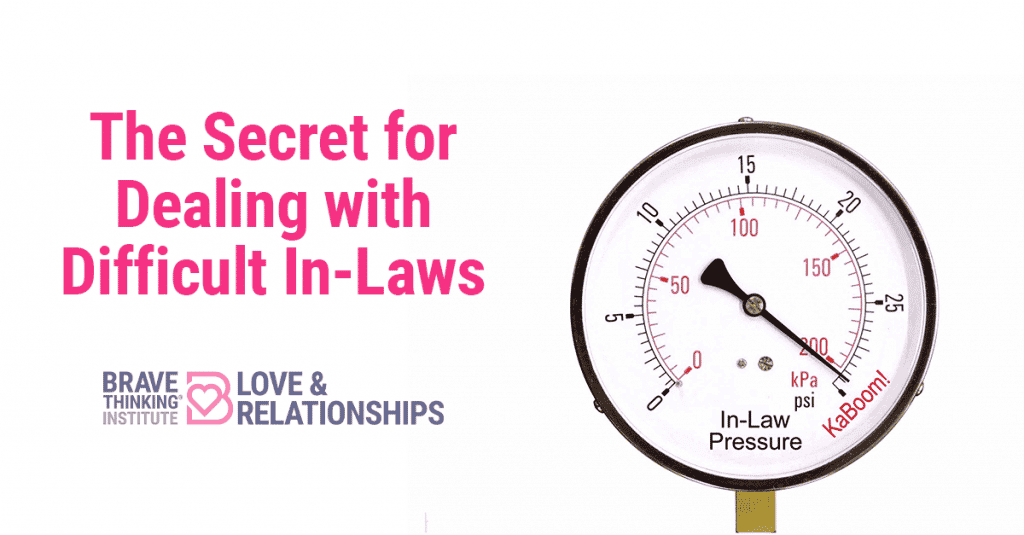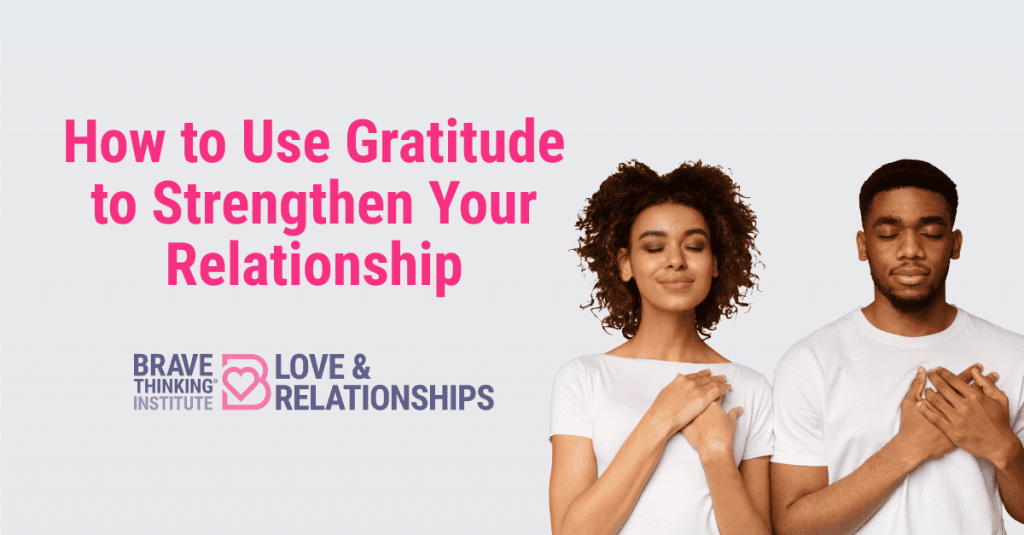Learn 3 powerful ways to deal with difficult in-laws and keep your peace of mind.
“Knowing your own darkness can be the best method for dealing with the darknesses of other people.” – Carl Jung
Dealing with difficult in-laws puts a lot of strain on a relationship. And this isn’t just a topic of concern for married couples. This can be a breaking point for any type of relationship.
Think about it. You meet this amazing guy. He’s sexy and charming. You get along on a deep level. Everything about him is fantastic. You’re ready to make it official. And then you meet his family… ooof.
His mom talks down to you. The dad cracks off-color jokes. His brother is the poster boy for toxic masculinity. What do you do?

Obviously, those are dramatic examples and I hope you’re not dealing with all of that. But, even moderately difficult relationships with one of your man’s family members can be challenging.
Are you going to throw away what might be the best relationship of your life to avoid his family?
Of course not. There are proven ways to deal with difficult people that not only improve the relationship, but help you grow emotionally. I know, you’re really just looking for ways to make them less horrible…
There’s no magic pill to fix someone else’s behavior. You can learn to find common ground, lessen friction, and maybe even gain a new family member you actually like hanging out with.
In today’s post, we’re diving into the inner workings of in-law relationships. We’ll talk about why your man’s family can be so challenging and you’ll get my 3 tips for dealing with difficult in-laws. We’ll also talk about our own mindset, which is so important.
Dealing with difficult people can have a negative impact on your own self-confidence, and that’s something to guard against.
My Free Self-Love Activation Kit includes an affirmation practice to increase your self-worth and confidence. Download it today, whether you have difficult in-laws or just need a boost of self love.
Why Are In-Laws So Difficult?
There are 3 common reasons that in-law relationships are notoriously strained. These include the fact that there are multiple people involved (rather than 2), the relationships aren’t chosen, and there’s an extended family dynamic at play.
Multiple People.
By nature, there are more than 2 people involved in an in-law relationship. There’s you, your man, and his family member. This makes the relationship more complicated because it’s not just the common ground between you and his family member. He’s in the middle. That means that you both risk alienating a person who is very important to you through your conflicts with each other.
The Relationships Aren’t Chosen.
Most of our relationships are with people we choose or have a shared history with. In-laws are people we inherit through our significant other. And for their family, we’re a person our man chose, usually without consulting them. This scenario can be more difficult to build into a true friendship. It’s not built on the foundation of shared interests or chemistry that inspires most relationships.
The Family Dynamic.
As the significant other, you’re walking into a family dynamic that has evolved over your man’s whole lifetime. There’s a history that you’re not a part of and there may be all sorts of underlying issues you’re not aware of, like sibling rivalries.
The four horsemen of conflict communication are factors that sabotage relationships. While our post on that subject was geared for romantic relationships, the knowledge can help with all types of communication, even with in-laws.
There can be a bit of human jealousy and fear at the beginning of many of these relationships. The family dynamic is set before the “new person” comes along. A change in dynamic can be upsetting for everyone on some level.
There is also a preconceived notion that in-laws are difficult. In other words, you may expect them to be a nightmare.
The difficult mother-in-law is practically a given, right? Of course, there are healthy relationships with in-laws, but the drama tends to get noticed more often.
Here’s some good news. Studies show that your perception dictates how a relationship goes. If you believe you’ll have a close relationship with your man’s family, you’re more likely to get along well. On the other hand, if you believe it will be a negative experience, you’re more likely to pinpoint all of the flaws.
Dealing with Difficult In-Laws: 3 Tips
There are 3 tips that I’ve found amazingly valuable when dealing with difficult people. Using these tips can help you separate their negativity and any strain in the relationship from how you show up as a person. In other words, using these tips means that they won’t be able to step on your vibe, or lower your energy level. My 3 tips:
- Adopt a Beautiful Mindset
- Detach Your Kindness from Their Response
- Appreciating Feedback Does Not Equal Implementing Feedback
Adopt a Beautiful Mindset
The first thing that you must do is adopt a beautiful mindset. With this type of mindset, you recognize that dealing with difficult people means you’re given greater opportunities to increase your capacity to love others and even to love yourself.
I won’t tell you it’s easy, because that would be a lie.
I will tell you that without those challenges you don’t have the same opportunities to evolve your heart and ability to empathize.
So how do you adopt a beautiful mindset?
First, you must recognize when you deal with someone who’s difficult, they are giving you the best that they can. Everyone is a hero in their own story. They probably aren’t being difficult just for spite. They’re coming from an authentic place.
When they know better, they can do better.
It’s easy to hold people to a higher standard. But the truth is that not everyone has the same standards. They’re operating from their own level of consciousness.
I encourage you to think about what that person’s nature is. If this is their personality and they are at this level of consciousness, how do you engage in the relationship?
Because when you get really honest about that, you’ll often find that the way you communicate can make a difference in how they respond.
Detach Your Kindness from Their Response
It’s easy to be kind to someone who is kind to you. It’s not as natural to be kind to someone who is critical or hurtful.
If you learned growing up that you should treat people the way that they treat you, I want you to pause right here.
It sounds fair on the surface, but it’s not true. You are responsible for the way that you treat others. No one deserves to be treated poorly or to be spoken to in an unkind way.
Regardless of their treatment of you, you’re responsible for your own words and actions. And, the self you bring forward has an impact on the energy level. If you always commit to kindness, the energy level you’re bringing to the relationship is at its highest.
That’s not easy to do when someone is always snarky or insulting. And you’re perfectly within your rights to limit their access to you if that doesn’t improve.
But often what happens is that you respond to their unkindness with unkind words of your own. And that spirals into something that keeps growing and getting worse.
When you master your own response and divorce it from theirs, you’re putting the brakes on the momentum of negative energy.
I’m reminded of a story my mom told me…
A man was upset with his mother-in-law and wanted to get rid of her. She was awful and he had a list of reasons why his life would be better without her. So he went to the wise man of the village.
“I want you to help me get rid of my mother-in-law. She’s poisonous. She’s horrible. I want to kill her.”
The wise man looked at him with quiet appraisal before responding.
“I will help you kill your mother-in-law, but you must do something first. For two months, you have to be the best you’ve ever been to her. Help her with the food. Help her around the house. Fix things that she needs fixed. Run errands for her. Speak kindly to and about her. If you do all this, no one will ever suspect you because they will assume you loved her far too much to be at fault.”
The man’s eyes lit up.
“That’s brilliant! I’m going to do it.”
Three months went by without a word from the man. Then, one day, the wise man of the village ran into the poor son-in-law again.
“You never came to see me,” the wise man said, “Are we still going to kill your mother-in-law?”
The man blushed and stammered.
“I can’t believe I asked you to do that. I would never do that. I love her too much.”
I love that story. Because the difficult people in your life might be the same way. They’re holding their compassion thinking you don’t like them. You’re doing the same. That creates a cycle…
What if you consciously created a cycle that was full of love and care instead?
Appreciating Feedback Does Not Equal Implementing Feedback
One of the most challenging things about in-laws can be their opinions. Some of them have an opinion about everything.
They tell you how to raise your kids, what to eat, where to live, how to decorate… you get the idea. They have opinions and they are vocal about them.
Some of these shares might be their way of trying to be helpful. It often feels a lot like judgment. As if doing it their way is the right way and your way is the wrong way.
Remember, you’re an adult. You are the Queen of your own domain. You get to make all the decisions for your life.
You’re not obligated to engage in any debate with your in-laws to keep doing things the way you decide to do them. Some ideas as a response:
“Thank you for your input.”
Or
“Thank you for the idea. I’m going to consider that.”
Then you can simply move on and switch the topic. There’s no reason to feel compelled to argue your opinion or even disagree with their ideas.
You can implement the idea or not. Thanking them for taking the time to offer their opinion can often diffuse any negativity that comes up during this type of exchange.
Dealing with Difficult In-Laws Without Sacrificing Your Self-Confidence
Today, we talked a lot about dealing with difficult in-laws. But it’s advice that will help you navigate any type of relationship.
We’ve discussed 3 common reasons why in-laws can be so difficult to build a healthy relationship with. This gave you a little extra understanding about where the common tension points might come from.
I also gave you 3 tips for dealing with difficult in-laws so you can more easily build a positive relationship with those less than sunny personalities. One of the reasons these negative exchanges are so challenging is because they sap our own self-confidence and lower our energy levels.
Looking for ways to increase your self-love, even in the face of the most difficult environment? As my free gift to you, download the Self-Love Activation Kit designed specifically to help you boost your confidence and increase your sense of worthiness.



like your suggestions
Techniques & examples are readily
Understandable.
Enjoy reading explanations
Human relations especially family
ties are interesting.